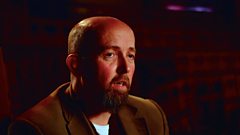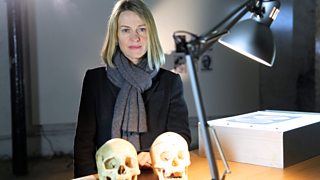
Instruments of Murder
Gabriel Weston investigates the forensic advances that have elevated the murder weapon from its role of mere evidence to that of key witness.
Sherlock has his mind palace, Morse his music - every detective has an edge. For most, it's forensic science. This three-part series provides a rare and fascinating insight into the secret history of catching murderers, charting two centuries of the breakthroughs that have changed the course of justice. Surgeon and writer Gabriel Weston explores this rich history through some of the most absorbing, and often gruesome, stories in the forensic casebook - and looks ahead to how forensics will continue to solve the murders of the future.
Where there's a murder there's usually a weapon. It's a key piece of evidence that can hold all the clues needed to catch the killer and shine a light into the mind of the murderer. In this final episode, Gabriel investigates the forensic advances that have elevated the murder weapon from its role of mere evidence to that of key witness.
Arsenic, the undetectable weapon of choice in the 19th century, was exposed as the murder weapon with one simple chemical test, and distinctive marks left on a victim's skull led detectives to the murder weapon and the killer.
Gabriel also looks to the future and the latest advances in forensics. Scientists have developed 3D laser scanning that can be used to reconstruct the exact sequence of events at the scene of a gun crime and decipher whether a shooting was murder or self-defence. Gabriel also investigates the pioneering chemistry that can now determine where in the world someone has spent time based on just a few strands of their hair.
Last on
More episodes
Previous
Next
You are at the last episode
See all episodes from Catching History's Criminals: The Forensics Story
Clips
Credits
| Role | Contributor |
|---|---|
| Presenter | Gabriel Weston |
| Series Producer | Graeme Thomson |
| Executive Producer | Jacqueline Smith |
| Producer | Emma Oastler |
| Director | Emma Oastler |
Broadcasts
- Thu 2 Jul 2015 21:00
- Fri 3 Jul 2015 02:30
- Mon 6 Jul 2015 22:00
- Wed 2 Dec 2015 23:20
- Sat 5 Dec 2015 23:00
- Wed 14 Sep 2016 22:00
- Thu 15 Sep 2016 03:00
- Thu 1 Jun 2017 23:30
- Tue 23 Jan 2018 23:00
- Thu 9 May 2019 23:00
- Wed 15 Jan 2020 22:00
- Sat 5 Jun 2021 22:45
- Mon 14 Aug 2023 23:35
Featured in...
![]()
Catching History's Criminals
Surgeon Gabriel Weston explores the history and development of forensic science
Learn More with The Open University
Delve deeper with The Open University to find out more about the science behind forensics



